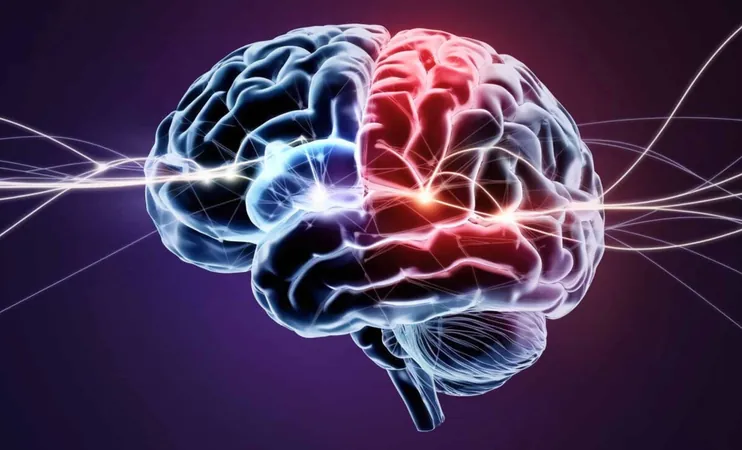
What If You Could Access Memories After Death? Groundbreaking Science Raises Intriguing Possibilities
2025-01-06
Author: Ling
The boundary between life and death is becoming increasingly blurred as scientists explore the futuristic concept of extracting memories from the brains of deceased individuals. While it has long been relegated to the science fiction genre, recent advancements in neuroscience hint that, one day, partial memory retrieval may become a reality. This profound possibility, however, raises significant scientific, ethical, and philosophical questions—especially regarding the nature of memory itself and our access to it after death.
The Science of Memory: Unraveling the Engram Mystery
At the core of this fascinating exploration is the engram—the physical manifestation of memories within the brain. Memories are thought to be encoded through interconnected groups of neurons, forming complex networks that transmit electrochemical signals across synapses. This synaptic framework forms the basis of both short-term and long-term memories, initiated often in the hippocampus before being solidified in other brain regions.
Don Arnold, a neuroscientist from the University of Southern California, outlines a hypothetical method for memory extraction that consists of several intricate steps:
1. **Identify Specific Neurons:** Pinpoint the exact neurons tied to a particular memory. 2. **Map Connections:** Understand how these neurons are interlinked through synapses, forming the memory's structural basis. 3. **Artificial Reactivation:** Simulate the natural firing of these neurons to potentially "reconstruct" the memory.
Importantly, Arnold clarifies that decoding the engram refers to the memory's storage location rather than the memory itself. Even with advanced technologies, recreating the actual experience of the memory may remain out of reach.
Animal Studies: Paving the Way for Human Memory Insights
Research on animals provides a crucial understanding of memory retrieval. A groundbreaking study published in 2012 demonstrated that scientists could activate a mouse's memory by targeting specific neurons linked to a fear-inducing experience. This manipulation led the mouse to remember the fearful event even when placed in a non-threatening environment.
Such findings indicate that memories can indeed be isolated at the neuronal level. However, translating this knowledge to human memory is fraught with challenges. Unlike mice, human experiences are deeply intertwined with abstract concepts, emotional layers, and personal relationships.
The Challenges of Human Memory Reconstruction
A significant hurdle to post-death memory extraction lies in the inherently fluid nature of memories. They evolve and alter over time through a process known as reconsolidation, which can lead to distortions. The engram might persist, yet any extracted memory could be an incomplete or altered version of the original event.
Additionally, memories are represented in various brain regions—sensory details may reside in the parietal lobe, while emotions typically link back to the amygdala. As such, constructing a cohesive "neural map" of a memory would necessitate insight and precision that surpass our current understanding.
The Ethical Quagmire: Should We Extract Memories?
The potential for posthumous memory extraction raises substantial ethical questions. Memories are closely tied to personal identity and autonomy, provoking concerns about obtaining consent for such invasive processes. How can society regulate this emerging technology to prevent its misuse—be it for legal battles, commercial exploitation, or personal gain?
Moreover, considerations regarding the psychological impact on the living must not be overlooked. What implications would it hold for families to "relive" memories of a deceased loved one, especially if those recollections prove to be fragmented or misconstrued? Could such advances lead to a troubling scenario where even death does not offer the privacy and peace that individuals deserve?
As science marches forward and embarks on these groundbreaking explorations, one thing is clear: the implications of memory extraction extend far beyond the lab, impacting humanity’s understanding of life, death, and what truly defines us. As researchers continue to unravel the enigmatic nature of memory, society must engage in meaningful conversations to navigate the potential challenges ahead.



 Brasil (PT)
Brasil (PT)
 Canada (EN)
Canada (EN)
 Chile (ES)
Chile (ES)
 Česko (CS)
Česko (CS)
 대한민국 (KO)
대한민국 (KO)
 España (ES)
España (ES)
 France (FR)
France (FR)
 Hong Kong (EN)
Hong Kong (EN)
 Italia (IT)
Italia (IT)
 日本 (JA)
日本 (JA)
 Magyarország (HU)
Magyarország (HU)
 Norge (NO)
Norge (NO)
 Polska (PL)
Polska (PL)
 Schweiz (DE)
Schweiz (DE)
 Singapore (EN)
Singapore (EN)
 Sverige (SV)
Sverige (SV)
 Suomi (FI)
Suomi (FI)
 Türkiye (TR)
Türkiye (TR)
 الإمارات العربية المتحدة (AR)
الإمارات العربية المتحدة (AR)